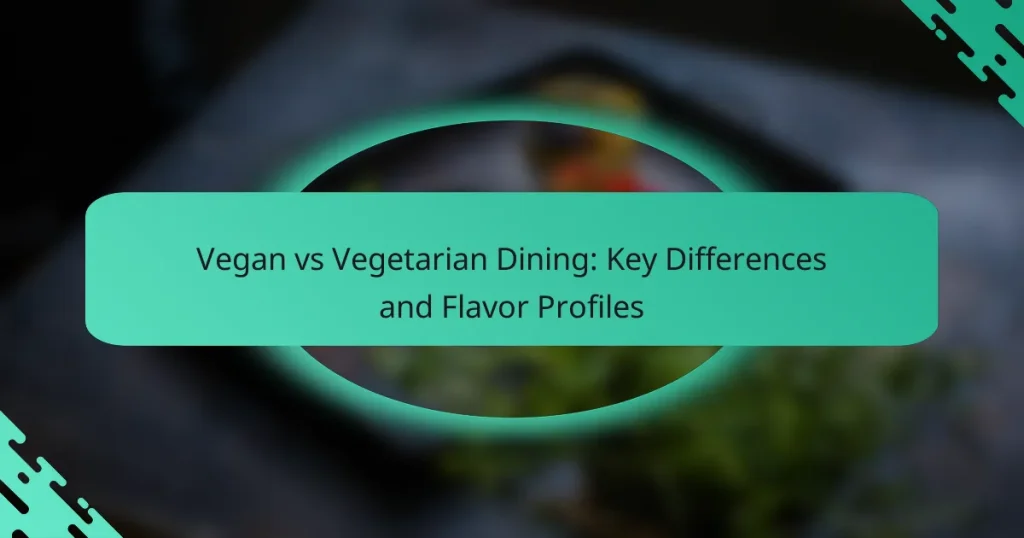When exploring dining options, understanding the distinction between vegan and vegetarian cuisines is essential. While both focus on plant-based ingredients, vegans eliminate all animal products, whereas vegetarians may include dairy and eggs in their meals. This key difference influences flavor profiles and dish variety, making each dining experience unique.

What are the best vegan dining options in Los Angeles?
Los Angeles offers a vibrant array of vegan dining options, catering to diverse tastes and preferences. From upscale restaurants to casual food trucks, the city is a haven for plant-based cuisine enthusiasts.
Plant-based restaurants
Plant-based restaurants in Los Angeles provide a full dining experience with innovative menus that highlight the flavors of vegetables, grains, and legumes. Many of these establishments focus on organic and locally sourced ingredients, ensuring freshness and quality.
Popular spots include Crossroads Kitchen and Gracias Madre, both known for their creative dishes that appeal to vegans and non-vegans alike. Reservations are often recommended, especially during peak dining hours.
Vegan food trucks
The vegan food truck scene in Los Angeles is thriving, offering quick and delicious meals on the go. These mobile kitchens serve everything from gourmet tacos to hearty burgers, making it easy to enjoy plant-based food anywhere in the city.
Some well-known food trucks include Kogi BBQ and The Vegan Joint. Keep an eye on their social media for locations and hours, as they often change throughout the week.
Vegan-friendly cafes
Vegan-friendly cafes in Los Angeles provide a relaxed atmosphere for enjoying coffee, smoothies, and light meals. Many of these cafes offer extensive vegan menus, including pastries, salads, and breakfast items.
Places like Cafe Gratitude and The Butcher’s Daughter are popular choices, known for their welcoming vibe and commitment to plant-based ingredients. These cafes often feature seasonal specials, so it’s worth checking their menus regularly for new offerings.

What are the best vegetarian dining options in Los Angeles?
Los Angeles offers a vibrant array of vegetarian dining options, catering to various tastes and preferences. From dedicated vegetarian restaurants to inclusive diners and brunch spots, the city has something for everyone looking to enjoy plant-based meals.
Vegetarian restaurants
Los Angeles is home to numerous vegetarian restaurants that focus exclusively on plant-based cuisine. Popular spots include Crossroads Kitchen, known for its upscale dining experience, and Gracias Madre, which serves organic Mexican dishes. Many of these establishments emphasize fresh, locally sourced ingredients, ensuring flavorful and nutritious meals.
When choosing a vegetarian restaurant, consider the menu variety and ambiance. Some places may offer a casual vibe, while others provide a more refined dining experience, making it easy to find the right fit for any occasion.
Vegetarian-friendly diners
Many diners in Los Angeles cater to vegetarian preferences by offering a range of meat-free options on their menus. Establishments like Johnnie’s Pastrami and Mel’s Drive-In feature vegetarian burgers, salads, and breakfast items that appeal to both vegetarians and non-vegetarians alike. This inclusivity makes it easier to dine with friends or family who may have different dietary choices.
When visiting a vegetarian-friendly diner, check for customizable options. Many places allow you to swap meat for plant-based proteins, ensuring everyone can enjoy a satisfying meal together.
Vegetarian brunch spots
Brunch is a popular meal in Los Angeles, and there are many spots that excel in vegetarian offerings. Places like Flower Child and Cafe Gratitude serve creative brunch dishes, from smoothie bowls to hearty grain bowls, all designed to highlight fresh vegetables and grains. These venues often feature a relaxed atmosphere, perfect for leisurely weekend meals.
For a successful brunch outing, consider making reservations, especially on weekends when demand is high. Additionally, look for places that offer unique drinks, such as fresh juices or plant-based lattes, to complement your meal.

What are the key differences between vegan and vegetarian diets?
The primary difference between vegan and vegetarian diets lies in the extent of animal product restrictions. Vegans avoid all animal-derived products, while vegetarians typically exclude meat but may consume dairy and eggs.
Animal product restrictions
Vegans eliminate all forms of animal products, including meat, poultry, fish, dairy, eggs, and even honey. In contrast, vegetarians often consume dairy products and eggs, allowing for a broader range of food options. This distinction significantly influences meal planning and ingredient choices.
For example, a vegetarian might enjoy cheese pizza or an omelet, while a vegan would opt for plant-based alternatives like vegan cheese or tofu scrambles.
Nutritional profiles
Nutritionally, both diets can be healthy, but they require careful planning to ensure adequate intake of essential nutrients. Vegans need to pay particular attention to vitamin B12, iron, calcium, and omega-3 fatty acids, which are commonly found in animal products.
Vegetarians may have an easier time meeting these nutritional needs due to the inclusion of dairy and eggs. However, both diets can provide sufficient nutrition if balanced with a variety of fruits, vegetables, whole grains, nuts, and seeds.
Environmental impact
Both vegan and vegetarian diets generally have a lower environmental impact compared to omnivorous diets, but vegans tend to have a more significant positive effect. By avoiding all animal products, vegans contribute to reduced greenhouse gas emissions, land use, and water consumption associated with livestock farming.
Studies suggest that transitioning to a vegan diet can cut food-related carbon footprints by a substantial margin, while vegetarian diets still offer considerable benefits. Choosing local and seasonal plant-based foods can further enhance these environmental advantages.

How do flavor profiles differ between vegan and vegetarian dishes?
Vegan and vegetarian dishes offer distinct flavor profiles due to their ingredient compositions. Vegan cuisine excludes all animal products, while vegetarian dishes may include dairy and eggs, leading to richer flavors in some cases.
Common ingredients
Vegan dishes primarily rely on plant-based ingredients such as fruits, vegetables, legumes, grains, nuts, and seeds. Common staples include tofu, tempeh, and various plant-based milk alternatives. In contrast, vegetarian dishes can incorporate dairy products like cheese, yogurt, and eggs, which add creaminess and depth to the flavors.
For example, a vegan pasta dish might use cashew cream for richness, while a vegetarian version could use a cheese sauce. This difference significantly impacts the overall taste and texture of the meals.
Cooking techniques
Vegan cooking often emphasizes techniques that enhance natural flavors, such as roasting, grilling, and sautéing. These methods can bring out the sweetness in vegetables and create appealing textures. Vegetarian cooking may also use these techniques but can include methods like baking with cheese or egg-based dishes that add a different layer of flavor.
For instance, a vegan stir-fry might focus on vibrant vegetables and spices, while a vegetarian version could incorporate scrambled eggs for added protein and richness.
Spice usage
Spices play a crucial role in both vegan and vegetarian dishes, but the choice of spices can differ. Vegan cuisine often utilizes bold spices and herbs to compensate for the absence of animal fats, enhancing the overall flavor profile. Common spices include cumin, turmeric, and chili powder.
Vegetarian dishes may also use these spices but can benefit from the additional flavors provided by dairy, such as creamy sauces that mellow out spiciness. For example, a vegan curry might rely heavily on spices for flavor, while a vegetarian curry could balance spices with coconut milk or yogurt.

What are the health benefits of vegan dining?
Vegan dining offers several health benefits, primarily due to its emphasis on plant-based foods. By eliminating animal products, individuals often experience improvements in overall health markers, including cholesterol levels and nutrient intake.
Lower cholesterol levels
One of the most significant benefits of vegan dining is the potential for lower cholesterol levels. Plant-based diets are typically low in saturated fats found in animal products, which can contribute to high cholesterol. Studies suggest that adopting a vegan diet can lead to reductions in total cholesterol and LDL (bad cholesterol) levels.
To achieve this, focus on whole foods like fruits, vegetables, whole grains, and legumes while avoiding processed foods high in unhealthy fats. Regularly incorporating foods rich in soluble fiber, such as oats and beans, can further help manage cholesterol levels.
Increased nutrient intake
Vegan dining often results in increased nutrient intake, particularly of vitamins, minerals, and antioxidants. A well-planned vegan diet is rich in fruits, vegetables, nuts, and seeds, which provide essential nutrients like vitamin C, potassium, and magnesium.
To maximize nutrient absorption, include a variety of colorful produce in your meals. For example, leafy greens, berries, and nuts should be staples in a vegan diet to ensure a broad spectrum of nutrients. Consider fortified foods or supplements for nutrients like vitamin B12, which is primarily found in animal products.
Weight management
Many individuals find that vegan dining supports effective weight management. Plant-based foods are generally lower in calories and higher in fiber, which can promote satiety and reduce overall calorie intake. This can be particularly beneficial for those looking to lose or maintain weight.
To leverage this benefit, focus on whole, unprocessed foods and limit high-calorie vegan options like sweets and fried foods. Regular physical activity combined with a balanced vegan diet can enhance weight management efforts, making it easier to achieve and sustain a healthy weight.

What are the health benefits of vegetarian dining?
Vegetarian dining offers numerous health benefits, including lower risks of chronic diseases and improved overall wellness. By focusing on plant-based foods, vegetarians often consume more essential nutrients while reducing unhealthy fats and cholesterol.
Heart health improvement
Vegetarian diets can significantly improve heart health by lowering blood pressure and cholesterol levels. Foods rich in fiber, such as fruits, vegetables, and whole grains, help maintain a healthy cardiovascular system.
Incorporating legumes, nuts, and seeds into meals can provide healthy fats, which are beneficial for heart function. Studies suggest that a vegetarian diet may reduce the risk of heart disease by up to 30-50% compared to diets high in red and processed meats.
To enhance heart health, focus on incorporating a variety of colorful vegetables and whole foods. Avoid processed vegetarian options high in sodium and sugar, which can negate the benefits of a plant-based diet.


